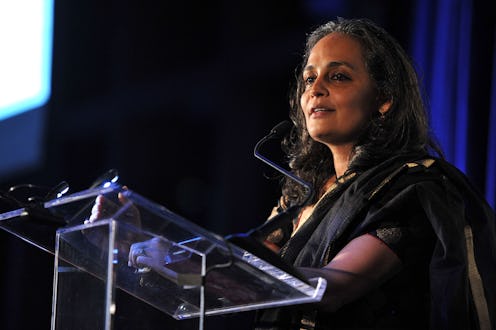Books
Too Much Talk About Her Looks, Not Her Books
When reading a profile of a Man Booker Prize-winning author, the last thing you expect to see is a piece that's hyper-focused on the author's appearance and contemptuous of her ideas, but apparently these things do happen. Or at least, that's what happened in The Guardian' s profile of Arundhati Roy, author of the incredible novel The God of Small Things. Because, apparently, sexism triumphs again.
The profile by Andrew Anthony spends most of its first two paragraphs talking mostly about Roy's looks and age. Anthony notes her small size, her "piercing dark eyes," her "bright easy smile," and "warm presence" — and just keeps going, discussing her grey hair, her "youthful face," and contrasting her appearance with a photograph from the year her prize-winning novel was published. The novel itself comes up briefly in this opening, mostly in relation to what another (male) author thought of it, and how Anthony seems to feel that the novel is befitting her physical appearance. "Looking at her," he writes, "it’s not hard to detect the author of the richly empathetic The God of Small Things."
Because if a woman happens to write a novel that won the English language's most distinguished prize for literature, it has to somehow be connected to her looks, right?
Looking at the story as a whole, it appears rife with not only objectification, but also mansplaining and whitesplaining. Anthony not only continuously circles back to Roy's appearance, but he also seems intent on tearing down her political beliefs and her understanding of her native country. Though it seems self-evident that Roy, as a politically engaged Indian woman who has lived in India her entire life, has a perfectly valid perspective on the country, the author seems intent on discrediting it in the article.
Throughout the piece, Anthony clearly fundamentally disagrees with Roy's rather anti-capitalist worldview, and her take on modern-day India. He calls her outlook "a scattergun approach," and makes assertions such as "Roy never really gets to grip with the evidence." He criticizes her for quoting Pablo Neruda because Pablo Neruda once supported Stalinism. He even goes so far as to describe her own succinct summary of her early life a misleadingly "romantic" view — and then proceeds to reframe her life story for her. He characterizes her various political statements against the Indian caste system, capitalism, and imperialism as a "screed."
It all comes off as condescending, insulting, and often times just plain sexist, given that he doesn't stop linking her beliefs to her to her appearance with statements such as, "The shrill prose is hard to reconcile with the softly spoken middle-aged woman sitting opposite me."
Understandably, plenty of people were not pleased.
It's no secret that women have a hard time being taken seriously in the literary world. Everything from the VIDA count to coverflip to the need for a #ReadWomen2014 campaign make that pretty clear. It's in this sort of climate that a profile of a woman who won the Man Booker Prize for her debut novel can be objectified and her political beliefs not just criticized but belittled.
Women are more than our looks. Women can have value that is not tied to our appearance. Women can have radical political opinions. And no matter our ages, appearances, politics, or nationalities, women deserve respect.
